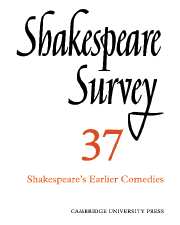Book contents
- Frontmatter
- Criticism of the Comedies up to The Merchant of Venice: 1953–82
- Plotting the Early Comedies: The Comedy of Errors, Love’s Labour’s Lost, The Two Gentlemen of Verona
- The Good Marriage of Katherine and Petruchio
- Shrewd and Kindly Farce
- Illustrations to A Midsummer Night’s Dream before 1920
- The Nature of Portia’s Victory: Turning to Men in The Merchant of Venice
- Nature’s Originals: Value in Shakespearian Pastoral
- 'Contrarieties agree': An Aspect of Dramatic Technique in Henry VI
- Falstaff’s Broken Voice
- ‘He who the sword of heaven will bear’: The Duke versus Angelo in Measure for Measure
- War and Sex in All’s Well That Ends Well
- Changing Places in Othello
- Prospero’s Lime Tree and the Pursuit of Vanitas
- Shakespearian Character Study to 1800
- How German is Shakespeare in Germany? Recent Trends in Criticism and Performance in West Germany
- Shakespeare Performances in Stratford upon–Avon–and London, 1982–3
- The Year's Contributions to Shakespearian Study 1 Critical Studies
- 2 Shakespeare’s Life, Times and Stage
- 3 Editions and Textual Studies
- Index
Nature’s Originals: Value in Shakespearian Pastoral
Published online by Cambridge University Press: 28 March 2007
- Frontmatter
- Criticism of the Comedies up to The Merchant of Venice: 1953–82
- Plotting the Early Comedies: The Comedy of Errors, Love’s Labour’s Lost, The Two Gentlemen of Verona
- The Good Marriage of Katherine and Petruchio
- Shrewd and Kindly Farce
- Illustrations to A Midsummer Night’s Dream before 1920
- The Nature of Portia’s Victory: Turning to Men in The Merchant of Venice
- Nature’s Originals: Value in Shakespearian Pastoral
- 'Contrarieties agree': An Aspect of Dramatic Technique in Henry VI
- Falstaff’s Broken Voice
- ‘He who the sword of heaven will bear’: The Duke versus Angelo in Measure for Measure
- War and Sex in All’s Well That Ends Well
- Changing Places in Othello
- Prospero’s Lime Tree and the Pursuit of Vanitas
- Shakespearian Character Study to 1800
- How German is Shakespeare in Germany? Recent Trends in Criticism and Performance in West Germany
- Shakespeare Performances in Stratford upon–Avon–and London, 1982–3
- The Year's Contributions to Shakespearian Study 1 Critical Studies
- 2 Shakespeare’s Life, Times and Stage
- 3 Editions and Textual Studies
- Index
Summary
In matters of origin, literature is both creationist and evolutionary. Whether we view the evolution of literary forms and works as imitations of or reactions against previous generations of writers, the shaping hand of the individual author remains the supreme generative force. No literary kind has changed so radically yet retained so much of its original power under the hand of individual geniuses as the pastoral, from Theocritus to Robert Frost. Shakespeare inherited the pastoral in many of its classical forms and Renaissance anti-forms, and he transmuted it into tones ranging from the soft pastoral of A Midsummer Night's Dream to the hard pastoral of King Lear, but the most characteristic action in his pastoral plays involves characters retrieving or reinventing their origins in a natural setting.
A frequent accusation against the pastoral is that its emphasis on withdrawal from society serves only to glorify nostalgia and moral lassitude. Friedrich Schiller, for example, asserted that pastoral idylls ‘cannot vivify, they can only soften’ because of the value they traditionally attach to otium. In a similar vein Renato Poggioli begins his major study of pastoral saying ‘The psychological root of the pastoral is a double longing after innocence and happiness, to be recovered not through conversion or regeneration, but merely through a retreat.’
- Type
- Chapter
- Information
- Shakespeare Survey , pp. 69 - 74Publisher: Cambridge University PressPrint publication year: 1984



